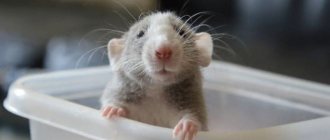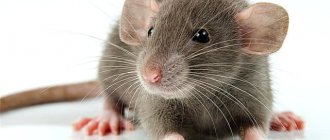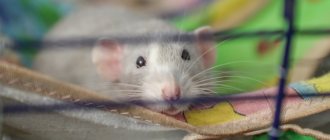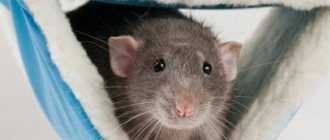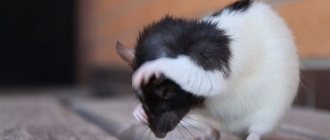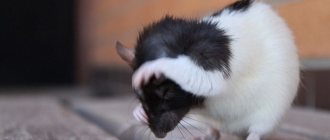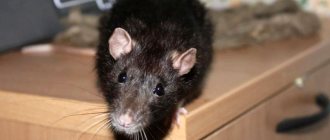Behavioral features
Rats detect any changes in the owner's voice, so raising your voice or using brute force for punishment is not acceptable. A frightened animal will become downtrodden and wild.
Try turning the guilty rodent onto its back. In nature, such punishment is used by the leader of the pack, so the rat realizes guilt and is filled with respect.
The only punishment for a rodent is to turn it over into a subordinate position
With a good attitude, the pet becomes imbued with love and begins to show talkativeness (coos, chirps, grunts). But even in this case, all sounds have their own interpretation and contain an obligatory subtext.
Forecast
Rat respiratory mycoplasmosis is usually a chronic disease, but early treatment reduces the severity and duration of the disease.
Antimicrobial therapy may not completely eliminate the infectious agent, so treatment is often necessary to repeat. Infected rats usually remain a potential source of disease transmission to other rats throughout their lives.
What sounds do domestic and wild rats make?
Under natural conditions, rodents live in colonies and communicate in three complementary ways:
- High frequency sounds. Used by cubs to find their mother or by males during the mating season. The human ear is not able to recognize this signal.
- Chirping. Rapid rhythmic chattering of teeth is used to warn relatives of approaching danger. A domestic rat can also chirp if it is scared.
- Smells. They play a key role, since the rat’s sense of smell is more developed than other senses. Wild animals mark their territory with scent glands, and also recognize relatives by a specific smell.
Reference! Rats are myopic, so visual perception does not play a key role for them.
As they became domesticated, people learned to distinguish and identify some of the sounds of their pets.
Hiss
Just like cats, in moments of anger and irritation, rats bristle and hiss. In this case, it is better not to disturb them. If there are several other rodents living in the cage with the aggressor, carefully separate him from the others and leave him alone until he “cools off.”
Squeak
With the help of a piercing loud squeak, the animal tries to convey its fear or pain. Inspect the area around the cage and analyze what might have frightened your pet. It is likely that the rat could hear the cat or the hum of the vacuum cleaner from the next room.
If the rat does not live alone in the cage, put it away. Inspect carefully for bites and injuries. If there are no visible signs of damage on the body, and the pet does not calm down and continues to squeak for a long time, contact your veterinarian immediately. Your pet may experience severe pain due to internal injuries.
A quiet, barely audible squeak from stroking means that the rodent enjoys communicating with the owner.
An abrupt loud squeak when pulled out of the cage signals that the pet is not in the mood to contact a person.
Whistling
A long whistling sound in the throat is an attempt to attract the attention of the owner, a desire to receive affection.
The increasingly loud whistle is a mating call that helps males attract females for mating.
Chirping
Chirping, just like squealing or squeaking, is a sign that your pet is scared. The owner must examine the area around the cage to identify the threat and eliminate it. The rodent may also chirp when in pain.
Screech
A loud squeal or scream as if it is being killed is also called a rat's "cry." It indicates severe pain or fear of the rodent.
As in the case of squeaking, it is necessary to palpate the pet’s body. If, when you touch any place without visible external injuries, the animal begins to scream, you must take it to the veterinarian. Pain can be caused by internal injuries to the digestive tract as a result of feeding foods that are unsuitable for the rodent.
If you find any kind of injury in a rat (skid, cut), you need to provide it with first aid yourself: treat the wound with an antiseptic solution and stop the bleeding.
Grinding teeth
Sometimes rat owners are frightened by the strange sounds that their tailed pets make. Among them, for example, grinding teeth. In fact, this sound is similar to a cat purring. The creaking resonates in the body of rodents, and because of this it seems that the animal is trembling.
The tailed pet grinds its teeth when it is as calm, satisfied and full as possible.
Grunt
The rat often makes sounds that are similar to grunting from pleasure when communicating with the owner or receiving a favorite treat from him. However, grunting sounds for these rodents are not the norm, since they most often occur if the animal has rhinitis, pneumonia, heart problems or a deviated nasal septum.
If such a condition appears, it is better to show your pet to a veterinarian and make sure that his life is not in danger.
Important! Grunting sounds combined with shortness of breath, whistling, convulsions, blanching of the ears, blueness of the tip of the tail and paws are produced by dying rats. In this case, the animal needs to be given first aid - give a few drops of Corvalol, and then take it to the doctor.
Cough and sneeze
Cold symptoms in rodents and humans are very similar. The disease is manifested by coughing, sneezing, lacrimation, runny nose and apathy. When the first signs of respiratory diseases appear, your tailed pet should be shown to a veterinarian, since such diseases in rats develop very quickly and often cause death.
Sometimes healthy animals make sounds that vaguely resemble sneezing or coughing. They usually do this to intimidate their cagemates and to assume a leadership role.
Hoarse screech
Expresses aggression and is used when sorting out relationships with cagemates.
IMPORTANT! If the pet lives alone, then squealing signals a bad mood. Touching the animal at this moment is dangerous.
Coughing
The appearance of cough in rodents does not always signal illness. This sound is accompanied by anger and a demonstration of leadership.
High-pitched squeak
The animal experiences severe fear or pain.
IMPORTANT! If there are no obvious injuries, contact a veterinarian immediately. Internal damage is not always amenable to self-diagnosis.
Whistle in the ultrasonic range
With the help of a whistling sound in the throat, the pet demonstrates the desire to sit in the owner's arms. When the volume increases, the animal is not inclined to caress. Also, this frequency helps to establish contact with females.
How to decipher a rat squeak
Despite the variety of sound signals produced by tailed rodents, most often these animals express their feelings and mood with the help of squeaks. You can guess what this pet signal means by listening to how and with what intonation the rats squeak:
- if a rat squeaks when you pet it
, then perhaps it has a wound on its body, touching which gives it pain; - the animal's quiet squeaking from stroking or licking hands
can also mean that the pet is experiencing pleasure and joy from communicating with the owner;
- sometimes domestic rats, especially young rats, squeak and express approval and delight at watching the games
and fuss of their tailed brothers; - The animal's squeak also indicates that it is frightened. For example, with a loud, abrupt squeak,
a rodent notifies its owner that a cat has approached his cage and he needs protection; - if a rat squeaks when you pick it up
, then it is likely that the animal is not in the mood to play and communicate at that moment, and thus the pet expresses dissatisfaction with being disturbed.
Learning to understand rat “language” is not difficult. To do this, you just need to give the cute animal enough attention and care, because then the owner will easily understand what the little pet wants to tell him.
Can pet rats hiccup?
Hiccups in an animal occur against the background of:
- overeating;
- nervous excitement;
- hypothermia;
- helminthic infestation.
If the case of hiccups is isolated, then there is no need to worry - perhaps the rat has simply eaten too much. If attacks of hiccups occur periodically, then you need to think about changing food and carrying out preventive deworming.
Important! When hiccups are accompanied by heavy, wheezing breathing, take your pet to the vet immediately. There is a high risk of pneumonia or pneumonia. Without proper treatment, this can lead to the death of your pet.
Elimination of consequences
The body was thrown away, but the smell remained. This situation happens if the stench has been present in the room for a long time. Materials were saturated - paper, fabric, wood. You will have to carry out a whole range of measures to put the house in order.
- open windows, doors, make a draft in the room so that the stinking aroma disappears faster;
- put the torn board back in place;
- send curtains, bedspreads, napkins - all fabric products for washing;
- Apply cleaning agent to carpets and vacuum thoroughly;
- Sprinkle a thick layer of soda on the floor, it draws out the smell from the wood well - leave for 1-2 hours, vacuum;
- add chlorine or a detergent containing it to the water, wash the floor - whiteness is excellent;
- A special composition is prepared for processing furniture. Add 1 teaspoon of liquid soap and 50 g of soda to 0.95 liters of hydrogen peroxide. Mix thoroughly and pour into a spray bottle or spray bottle. Treat the hard surface of furniture. After 60 minutes, remove the composition with a damp cloth.
At the final stage, you need to use an air freshener.
Gets rid of the dead rat smell
Traditional methods of neutralizing the unpleasant odor of rats
Rats often die under the floor; people have come up with many ways to kill the smell or eliminate it completely after removing the body.
- Fire. Light a torch and walk around the room with it, especially in the room where there was a rat under the floor. Instead of a torch, you can use incense sticks.
- Vinegar. Moisten a cloth generously and leave for 10-12 hours. Ventilate the room well.
- Potassium permanganate. Prepare a solution, treat the floor, furniture, walls.
- Lavender. If the house smells strongly, the aroma of lavender can cover the smell. You can use a plant, air freshener, essential oils.
Anti-odor medications
Odor neutralizers deal with persistent stench. Eliminates the smell of urine and feces after animals. Used to eliminate the smell of a dead rat.
The preparations do not contain aggressive components that can damage furniture. Can be used on different surfaces, including the upholstered part of a sofa and armchairs. Unlike conventional cleaning agents, detergents provide quick, complete elimination of stench.
The product has no pungent odors, does not cause an allergic reaction, and does not emit toxins during evaporation. It is very convenient to use, since it is sold ready-made, with a sprayer.
The most common brands:
- Biolife Safe @ Clean, Germany;
- OdorGone, USA, lavender scent;
- Fridge Balls, South Korea, unscented.
You can use any air freshener or product designed to neutralize pet waste.
Can a rat scream?
A heart-rending squeal, scream, or, as it is also called, “crying” of a rat is a sign that the animal is very scared or in pain.
If there are no objective reasons for panic, and the pet continues to scream, carefully remove it from the cage and feel its body with your finger. As a rule, when a person touches a sore spot, the rodent begins to scream louder.
Note! In some cases, a rat may experience pain due to internal injuries to the esophagus after eating inappropriate foods.
Posts 1 page 30 of 30
Share12010-01-04 22:23:01
Good evening! My rat is 2 years old, for the last two weeks she has had a lot of discharge from her nose (similar to blood), is breathing heavily, and is sneezing. He doesn’t eat anything (or very little from his hands, if forced), and doesn’t drink water from the drinking bowl (we drink water from a syringe). I have lost a lot of weight, about half, if not more. Weakness is very noticeable, although he walks more or less, he generally drags his hind legs! Doesn't respond when I call, this has never happened before!
Today we went to the clinic, the doctor said it was heart failure! But this begs the question: is it possible to determine (visually) whether this is so? After all, the doctor didn’t even take Sanya in her hands. I just showed her nose, said that she doesn’t eat anything, doesn’t drink, she’s lost so much weight! You can see from the rat that she’s breathing very hard! Actually, that’s all they told me, they added that you can try to treat, pierce, for at least 5 days, if it gets better, then continue, no, put me to sleep!
What do you say about this? ________________________________ thank you in advance!
Share22010-01-04 22:43:57
- Author: Pyatihatochka
- Participant
- From: Ukraine, Kharkov
- Registered: 2009-08-14
- Invitations: 0
- Posts: 8175
- Female gender
- Age: 40 [1980-11-14]
- Spent on the forum: 1 month 28 days
- Last visit: 2013-10-15 19:28:31
Are there any sounds when breathing? Are your paws turning blue? Are your teeth of normal length? Are there still doctors who can LISTEN to the HEART for arrhythmia and the like, as well as the lungs and airways for wheezing?
Please don't be surprised - I edited the title of the topic. Topic titled “Help. “does little to show the essence of the problem and there shouldn’t be 100 such topics on the forum. We need specifics.
Share32010-01-04 22:50:20
nothing, I’m not surprised! =)) so, I ran and took a look, and now I’ll write everything! 5 sec!
Share42010-01-04 22:53:14
- Author: Pyatihatochka
- Participant
- From: Ukraine, Kharkov
- Registered: 2009-08-14
- Invitations: 0
- Posts: 8175
- Female gender
- Age: 40 [1980-11-14]
- Spent on the forum: 1 month 28 days
- Last visit: 2013-10-15 19:28:31
While members of the forum will advise how to decide on treatment, I would advise buying aminophylline in a 2.4% solution, sulfocamphocaine, prednisolone and furosemide in ampoules. Plus insulin syringes. If the condition worsens, they are used as emergency measures.
Share52010-01-04 23:01:00
Are there any sounds when breathing? - Well, it seems like he’s sniffling. Are your paws turning blue? - To be honest, this is my first rat, and I don’t really understand much, but it seems like no. I’m attaching a photo of the paws! Are your teeth of normal length? -Yes, I wouldn’t say, the bottom ones seem to be the same, but the top ones, some are shorter, the other is longer! I also took a photo just in case!
And also, as soon as she got worse, an employee at work advised my mother to give her “benzyl penicillin” to drink.
By the way! - blood (or whatever it is from the nose) comes only from the right nostril! And there is a little near the eye, either she smeared it with her paw, or I don’t know where it came from near the eye!
Edited by karolino4ka (2010-01-04 23:02:13)
Share62010-01-04 23:03:57
While members of the forum will advise how to decide on treatment, I would advise buying aminophylline in a 2.4% solution, sulfocamphocaine, prednisolone and furosemide in ampoules. Plus insulin syringes. If the condition worsens, they are used as emergency measures.
And where to inject? And How. It all needs to be mixed or something.
Causes of laughter in rats
Just like humans, rats react to tickling. This is due to neurons that have been identified in the brain of rats; they are responsible for the reaction to tickling in the form of laughter. Like in humans, they are located in the frontal lobes, which are responsible for mood (thanks to these same zones, the animal senses its body in space).
By tickling the paw (similar to a human foot), belly or behind the ears, you can make the animal smile or laugh. The animal gets pleasure and makes sounds that are very reminiscent of a person’s fervent laughter, and a satisfied grimace appears on its face.
To provoke laughter, you need to gently tickle:
- paws
- abdomen
- behind the ear
- withers
As evidence that rats experience positive emotions, the following is noted: after being tickled, the animal reaches out again to be tickled and looks forward to the owner playing with it again.
The approaching hand of a person during games brings a smile to the face; this is due to the developed intelligence of these rodents, which are able to remember and evaluate cause-and-effect relationships.
But not only by irritating sensitive areas, you can cause a smile and laughter. Studies have been conducted to determine whether rats can actually laugh and smile during positive emotions. The research was successful, and it was found that rats laugh while playing with their relatives, as well as when observing funny situations in the pack.
Surprisingly, scientists say that the female will choose as a partner the individual who laughs and does it more often than other candidates.
It is also believed that young individuals laugh more often. The laughter of rats is compared to the laughter of children; even their tickling zones (neck/withers) are the same.
In addition to laughter, rats can make other sound signals:
- A prolonged squeak, reminiscent of a scream - if you hear such a sound from your pet, it can indicate severe pain. In this case, inspect your animal for damage; it may have been injured. If there are no visible wounds, contact your veterinarian for help.
- Hoarse sounds - this is how the animal shows its aggressive attitude and tries to scare away a possible enemy. At these moments it is better not to touch the animal.
- Hissing or tremor of teeth also indicates a hostile attitude of the animal.
- Squeaking or short hissing sounds can indicate the animal’s readiness for mating; such sounds can be heard during mating games, between a female and a male.
It is worth paying attention to the following sound signals:
- Coughing or sneezing - this may indicate your pet has a cold; it is advisable to visit a veterinarian for an examination.
- Licking the owner's hands indicates a good attitude.
- Squeaking during touch - the tone of the sound indicates positive emotions, or pain.
- Grinding of teeth may indicate that the animal is experiencing positive emotions.
- Wheezing – may indicate difficulty breathing, for example if the animal has a cold. It is much worse if the wheezing occurs due to suffocation, for example if the animal choked on food.
It is very important to observe the pet’s behavior and be able to distinguish their sound signals in order to provide the necessary assistance and help the pet, or, on the contrary, not to touch it if the animal is passionate about its activities.
How to decipher a rat squeak
Despite the variety of sound signals produced by tailed rodents, most often these animals express their feelings and mood with the help of squeaks. You can guess what this pet signal means by listening to how and with what intonation the rats squeak:
- if a rat squeaks when you pet it
, then perhaps it has a wound on its body, touching which gives it pain; - the animal's quiet squeaking from stroking or licking hands
can also mean that the pet is experiencing pleasure and joy from communicating with the owner;
- sometimes domestic rats, especially young rats, squeak and express approval and delight at watching the games
and fuss of their tailed brothers; - The animal's squeak also indicates that it is frightened. For example, with a loud, abrupt squeak,
a rodent notifies its owner that a cat has approached his cage and he needs protection; - if a rat squeaks when you pick it up
, then it is likely that the animal is not in the mood to play and communicate at that moment, and thus the pet expresses dissatisfaction with being disturbed.
Learning to understand rat “language” is not difficult. To do this, you just need to give the cute animal enough attention and care, because then the owner will easily understand what the little pet wants to tell him.
conclusions
There is no need to console yourself with the hope that everything will go away on its own. If the disease is neglected, it will be very difficult to restore the pet’s health and avoid death. If timely assistance is not provided, the animal may die within a few days. Especially if the rat has stopped moving, eating and caring for itself, this is a cause for serious concern. Rush to consult a veterinarian
Sources
- https://homkin.ru/krysy/osobennosti-krys/strannye-zvuki.html
- https://animallittle.ru/zvuki-domashnih-krys.html
- https://litbro.ru/interesnoe/krysinyj-yazyk
- https://komanda89.ru/krysy/krysa-izdaet-strannye-zvuki.html
- https://zverek.org/krysa-tyazhelo-dyshit.html
[collapse]
Parasite infestation
A rat also sneezes when infected with skin parasites (fleas, lice eaters, ticks). This is accompanied by severe itching. Insect waste products cause a severe allergic reaction.
Fleas and lice eaters can be detected with the naked eye. To do this, you need to carefully examine the pet, parting the fur. As for ticks, this parasite is microscopic in size. It can only be detected with the help of a special analysis in a veterinary clinic.
If infected with parasites, the animal must be washed with pet shampoo. It is also useful to use Frontline or Bars spray.
Treatment methods
The main goal of drug treatment for stroke in rats is to negate the negative consequences after the stroke has occurred and relieve inflammation from the cells.
Along with therapy, it is very important that the animal feels comfortable and is surrounded by care and proper care.
There is no single cure for the consequences of a stroke; it is a whole range of measures, including:
- Rehydration of the body - for this, a rehydration solution is administered.
- Anti-inflammatory drugs - to relieve inflammation in brain cells and tissues.
- Antiemetics - if after first aid it does not go away and the animal continues to vomit.
- Sedatives - help cope with disorientation.
- Antibiotics - to prevent the addition of a secondary infection, because The rodent's body is weakened after a stroke.
- Oxygen - to eliminate the effects of brain hypoxia.
- Corticosteroids provide comprehensive treatment to eliminate the severe consequences of a stroke.
- Diuretics - to prevent swelling.
Before starting treatment, the specialist must carry out a number of diagnostic measures that are aimed at establishing a diagnosis and the reasons that led to the disease.
For diagnostic purposes, a CT scan (computed tomography of the head) and an X-ray of the rat’s head can be used; these measures will help identify hematomas and/or tumors. An ophthalmoscopy examination will help identify disorders in the retina and signs of hypertension; these data are necessary for prescribing therapy.
After diagnosis and treatment, the animal is sent home; further care and rehabilitation depends on the owner of the animal.
The attending veterinarian decides how to treat a stroke in a rat; without the necessary knowledge, self-medication can harm the animal even more, which will lead to dire consequences.
Disorders of the larynx
If the vocal cords are inflamed or compressed by swelling, the voice sounds different than usual. Hoarseness and hoarseness may appear, and in some cases it may disappear altogether.
Inflammation of the larynx is called laryngitis. Laryngitis is usually of an infectious nature, predominantly viral.
Since viruses penetrate a hypothermic body more easily, laryngitis usually occurs after being outside for a long time in bad weather, as well as drinking iced drinks, ice cream, etc. In addition, the larynx can become inflamed as a result of overstraining the vocal cords. This often happens to teachers, announcers, presenters who are forced to speak loudly and for a long time.
Symptoms of laryngitis in adults and children:
- change in voice - hoarseness, hoarseness;
- sore throat, discomfort;
- labored breathing;
- wet superficial cough, attacks of which usually occur in the morning, after waking up;
- body temperature may increase slightly (usually does not reach 38C);
- general weakness, malaise.
- A change in voice can be caused not only by laryngitis, but also by other diseases of the larynx - papillomatosis, laryngeal syphilis, the formation of a benign or malignant tumor. If laryngitis does not respond to standard treatment within 7-10 days, consult a doctor.
When to see a doctor
Wheezing is a sign of obvious pathology, so you should not hesitate in any case.
- If wheezing appears after a cold, against the background of a high temperature, you should call your local doctor to rule out pneumonia and other life-threatening diseases.
- The sudden appearance of wheezing, difficulty breathing, weakness, loss of orientation, dizziness is a reason to call an ambulance; we can talk about anaphylactic shock, bleeding, pulmonary or myocardial infarction.
- An ambulance must be called in any case if wheezing is observed in a baby of the first year of life, children under 3 years old, since the gaps in their bronchi are extremely small and any inflammatory process can result in oxygen starvation and suffocation.

